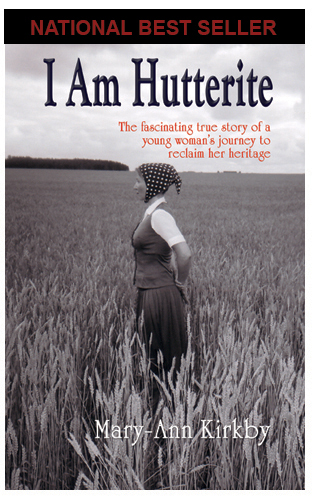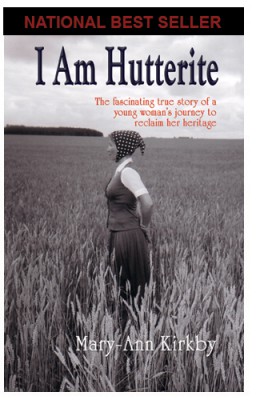I found just such a story when I recently read I Am Hutterite by Mary-Ann Kirkby. In this beautifully rendered story, she serves her readers a slice of life on the colony from her perspective of a young child after her mother had given birth to a younger sibling:
As soon as she arrived home from the hospital, Mother entered die Wuchen, a six-week period of special treatment extended to women after the birth of each child. This included a nine-week exemption from colony duty. Peterana was the cook for nursing mothers, and she delivered delicacies to our house every day. Rich foods like Nukkela Suppen (buttery dumplings), waffles soaked in whiskey, and plump cuts of chicken were carried over from the community kitchen in bowls and stainless-steel pails. While the rest of the colony ate regular fare at the long tables in the community kitchen, Mother had the privilege of inviting family and friends to dine with her at home. Most often, her guest of choice was my father.
Mary-Ann Kirkby is a gifted storyteller. I am with her in Kindergarten, which she started, as all other Hutterite children at age two and a half, when they began their religious training. She describes the soft, fresh buns after dipping them into Schmond Wacken (cream) with generous dollops of jam that she enjoyed for breakfast, and the stories, songs and games she participated in. I am with her when she and the other children went on outings to see the geese or visit the colony gardens. I feel as though her memories and mine meld when she describes opening the pods in the pea patch and pulling baby carrots from the ground.
Kirkby's childhood was as nearly idyllic as a child's can be. I love the way she sets the background for the day her life was to change forever when she was ten years old:
Across the western sky, the rich red, orange, and gold tones of a spectacular Manitoba sunset were bringing the soft summer day to a close. We felt spoiled by its beauty in Fairholme, for over and over again, even in the harshest of winters, we were treated to its splendor. Against this magic expanse of space, I was playing dodgeball with the children from the Essenschul. We all had the giggles, and our laughter infected a group of adults who had come to watch… I, as wide as was tall, kept eluding the ball….
Above the merriment, a voice pierced the warm air…
I won't spoil the story, but I will say that life on the colony was less than idyllic for Mary-Ann's father. And here is where I actually identify with Mary-Ann's parents for the tough choice they had to make, even though I know that life for Mary-Ann and her siblings was about to change… and not necessarily for the better.
I Am Hutterite is a wonderfully sensual story about Hutterite life, which does exactly what I thought such a story would… it brings Hutterites down to earth and puts a human face on them.
The same way that Kirkby's childhood story is nearly idyllic, so is this book nearly perfect. But I have three criticisms.
1. There is a subtitle on this book, "The fascinating true story of a young woman's journey to reclaim her heritage." There was only a very small portion of Kirkby's story that pertained to this, so I feel like this subtitle is not very accurate. And to that end, I wonder if Kirkby isn't trying to have it both ways… claim she is Hutterite, while still enjoying the personal freedom she would have to sacrifice if she were to actually rejoin life on the colony. Perhaps it comes of those good memories of her Hutterite childhood.
2. I love the first 198 pages of this book, but then Kirkby "summarizes" the rest of her story and wraps up loose ends much too quickly. I would have preferred that she save this part of her story for a sequel, so that she could tell the story in the same sensual details with which she had told her story thus far.
3. I read somewhere on Kirkby's website that she learned the art of telling stories from life on the colony. I felt I missed something, because I would have loved to have "been there" during a story-telling session.
Perhaps Kirkby did learn how to fashion a good story from her people, but I cannot believe that all her talent comes from observing the masters — I am willing to bet that she was born with her gift for storytelling that was then nurtured in her original community. Either way, I am glad she used her talent to bring us the story, I Am Hutterite. It carries an important message about a little-known culture in North America.




I, too, read this book and enjoyed it thoroughly. An interesting read, indeed.
I had the same issue, however, with the subtitle. She maybe reconnected with her ‘people’ but hardly reclaimed her heritage. Picky, picky me.
I just learned about the Hutterites when I was on a research trip a few weeks ago. This sounds like a fascinating book, Saloma. Thanks for sharing your review!
I learned about the Hutterites on a trip to Alcatraz earlier this year, I hadn’t ever heard the term before so I came home and did some internet research to find out more about them–which is part of what sent me on my journey to learn more about the Amish and Mennonites. I’ll definitely look for this book at the library, thanks for the review.
Interesting review, for sure! My two cents worth on this book: I know the people she grew up with and how hurt they were by some of the things she wrote. She’s also ‘quoting’ people, however those people have no recollection of the things she’s saying. Is it still ‘a true story’ then? It left me wondering, what is true and what is not. She is a good story teller, though and I especially enjoyed her accounts of her childhood on a colony.
hutt-writevoice.blogspot.com
I bought and read the book. About 14 years ago I came in direct contact with Hutterites leaving their colonies and adjusting to outside life. It wasn’t an easy thing.
Karen, thank you for your point of view… if you are being picky, then so must I be… but I guess that’s what book reviews are all about.
Sarah and Michelle, you’re quite welcome. Interesting how we didn’t know about the Hutterites, right in our own back yard, isn’t it?
Linda, I hear what you’re saying, though in Mary-Ann’s defense, memory is a funny thing… I would say that we all remember different things than someone else, AND those memories we do share with someone else, we remember differently. I’m sure there are those in my background who would make the same claims, but I wrote the truth as I remember it, and my guess is that Mary-Ann did too. Without having been there, I cannot know that for sure.
An interesting note on writing memoir… we can be as true to our memories as possible, but as soon as someone calls our “truth” into question, our tendency is to believe the person who is calling things into question as opposed to believing the person who wrote the memoir. Perhaps it’s an occupational hazard.
Katie, I don’t imagine it is easy to adjust to life off a colony. It’s hard enough to leave the Amish, and they do have more contact with the outside world, just by virtue of not living in cloistered communities.
Thanks, all for our comments.
Saloma
This sounds like it would be a great book to read. She seems like a gifted writer. I will look for it. Thank You!
Blessings, Joanne
Fascinating–sounds like it would make a great pairing with your book for a class study! I may have to do that sometime. :-)
I just finished reading this book, and enjoyed it very much. I thought Jake Maendel needed somebody to give him a good smack upside the head – hardly my idea of a Christian.
I do agree that the ending is very abrupt, but perhaps she felt that once her family got well established and proved they could manage off the colony she’d made her point. Still, I’d love to know how she got her job on TV, etc.
Growing up in Montana, I knew of the Hutterites, as they had a number of colonies in the area. But I never knew anything about them, except that they arrived in town some days, in their traditional clothing (to the stares of those of us who did not know them), and would come around in a huge farm truck to sell produce. One time, the truck pulled into our backyard drive and I was astonished to see all these men in their beards & black pants & vests up close! There are a great many Hutterite colonies throughout Montana, the Dakotas, & No. into Canada. Although the colonies used to be very isolationist, in recent years they have opened up some – my siter ever took a tour to visit one & enjoyed it very much. A few years ago I read a book by a young Hutterite woman which I found very informative. Surprisingly, she ended up writing a column for local newspapers for a few years, until she married and moved on to a different colony. It might be worth reading for anyone who would like more info. on this group. It’s called My Hutterite Life By Lisa Marie Stahl.
More info here:
http://library.ndsu.edu/grhc/order/general/stahl.html
I have never read any thing about the Heuterites (sp) but would like to. I love reading Amish stories likewise Mennonites, and the Quakers. So know I would love this one.
I am 75 yrs young and love reading and thanking God my eye sight still lets me. God bless all, Patti in VA
My sister lives in South Dakota and I my brother-in-law “deals” with them as he is a crop salesman. An interesting life.
Saloma,
I wondered if you have ever heard of another Anabaptist group…the Apostolic Christians. “we” came over during the Anabaptist movement and are closely related to the mennonite faith. Just another little tidbit…headcoverings, skirts, KJV of the bible only, no musical instruments, etc Just wondered!
I am reading Mary-Ann’s book now. I don’t want to read too much on this blog page because I haven’t finished the book yet! I wonder how the story will proceed in the remaining 40 pages or so … and now I know it’ll be wrapped up quickly :-)
I am enjoying the book a lot. I like the way Mary-Ann tells the story. I also love the dickens out of learning about Hutterites! The colony lifestyle fascinates me; I had no idea anyone lived that way.
Thank you for this post, Saloma!